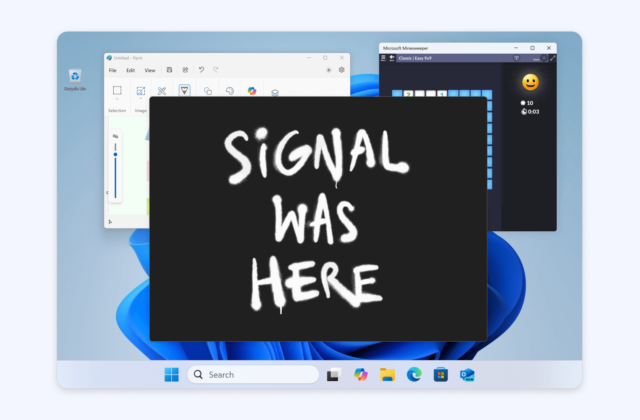Signal declares war on Microsoft Recall with screenshot blocking on Windows 11

Signal has officially had enough, folks. You see, the privacy-first messaging app is going on the offensive, declaring war on Microsoft’s invasive Recall feature by enabling a new “Screen security” setting by default on Windows 11. This move is designed to block Microsoft’s AI-powered screenshot tool from capturing your private chats.
If you aren’t aware, Recall was first unveiled a year ago as part of Microsoft’s Copilot+ PC push. The feature quietly took screenshots of everything happening on your computer, every few seconds, storing them in a searchable timeline. Microsoft claimed it would help users “remember” what they’ve done. Critics called it creepy. Security experts called it dangerous. The backlash was so fierce that Microsoft pulled the feature before launch.
SEE ALSO:
- Crapfixer 1.0 is here to fix Windows 11 and turn it into the operating system you deserve -- download it now!
- Move over Windows 11, Windows 12 is the Microsoft operating system we need
- Our favorite free Windows customization tool just got updated -- download Winhance 5 now!
- Say 'no thanks' Microsoft Windows 11 and 'yes please' to AnduinOS 1.3
- Windows 7 Reloaded solves Windows 11's biggest problem -- download it now
But now, in a move nobody asked for, Recall is sadly back. And thankfully, Signal isn’t waiting around this time. The team has activated a Windows 11-specific DRM flag that completely blacks out Signal’s chat window when a screenshot is attempted. If you’ve ever tried to screen grab a streaming movie, you’ll know the result: nothing but black.
According to Signal, this wasn’t the company’s first choice. Microsoft simply hasn’t given developers any real way to exclude their apps from Recall’s data vacuum, so the company had to use the same DRM mechanism Microsoft applies to movies and TV shows. And frankly, it’s hard to blame them. Signal exists to keep conversations private, and letting an AI tool silently capture chats defeats the entire point.
Now, users on Windows 11 who try to take screenshots of their Signal messages will come up empty. The screen security setting is easy to turn off (although you probably shouldn’t), but not without confirmation. Signal warns that disabling it could compromise privacy, and the app will clearly spell that out before letting users proceed.
There are usability trade-offs here, especially for people who rely on accessibility software like screen readers. Signal says it’s aware of those concerns, but Microsoft has left them with no better option. Apps like Signal shouldn’t be forced to hack their way around operating system features just to protect user privacy.
What’s especially frustrating is the inconsistency. Microsoft already excludes private browser windows from Recall, but hasn’t extended the same protection to messaging apps. That sends a pretty loud message: privacy in communications just isn’t a priority.
Signal’s move is more than a software update. It’s a message to Microsoft, and to anyone building invasive AI features into operating systems: privacy still matters. People don’t want an operating system that spies on their conversations in the background. And developers shouldn’t have to play defense just to do the right thing.
